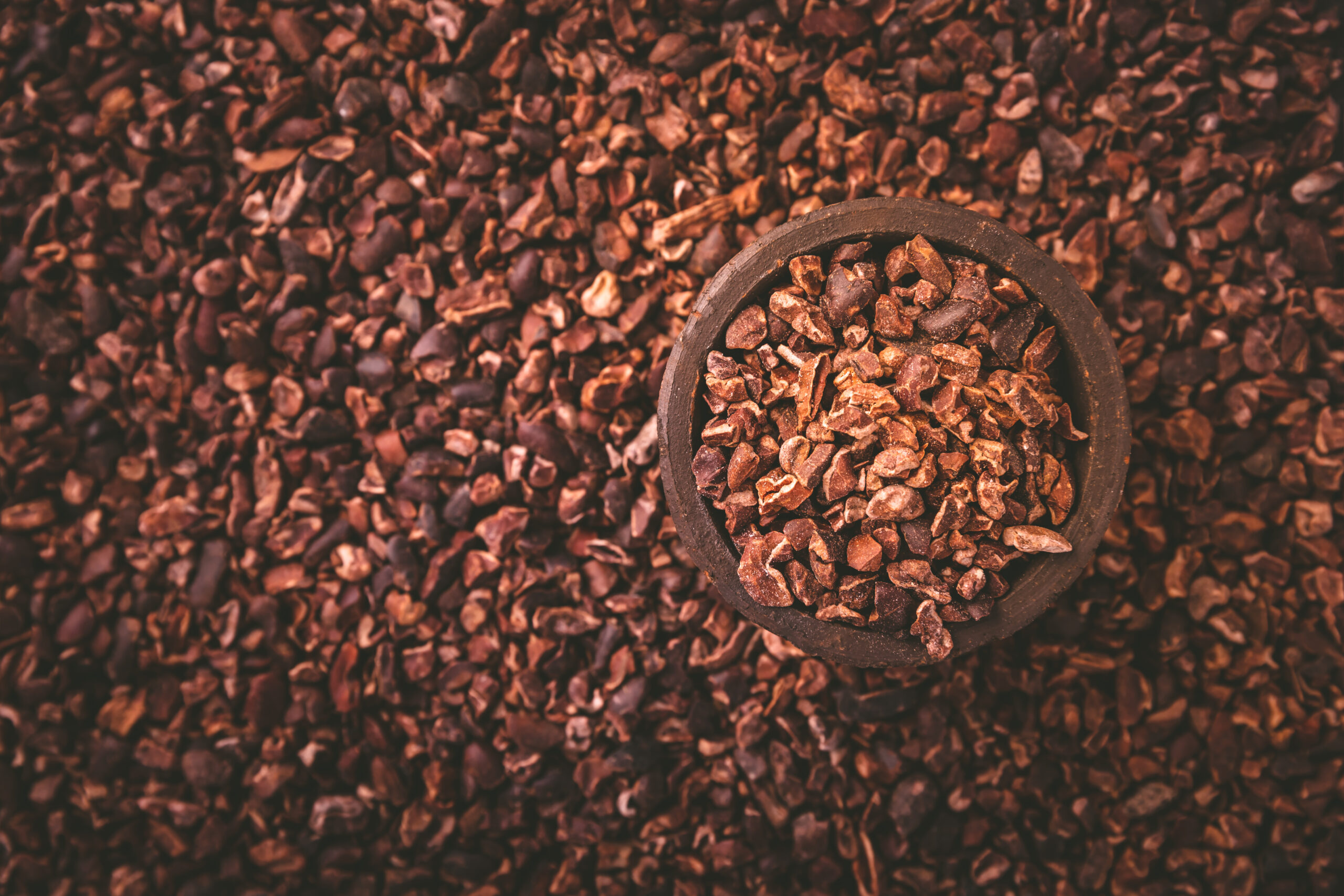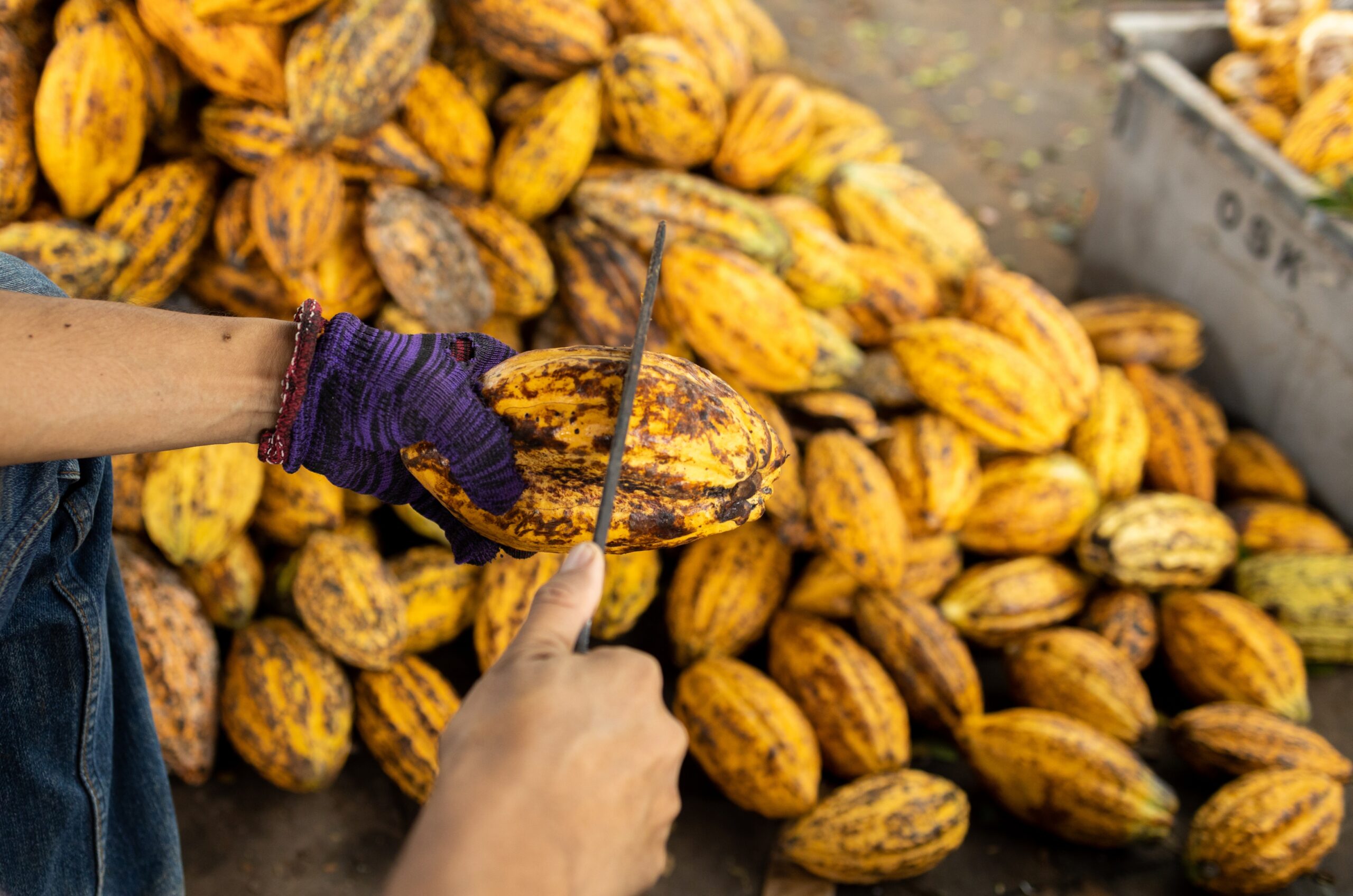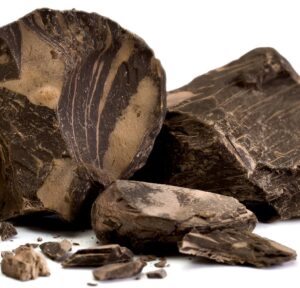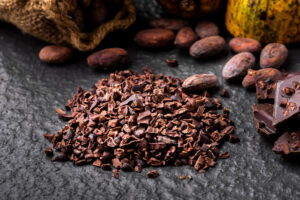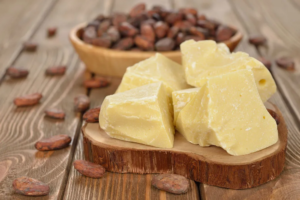Cocoa nibs are made from cocoa beans that have been roasted and gently crushed into small pieces. They have a rich, deep chocolate flavor and a natural crunch that makes them valuable both for chocolate making and as a healthy food ingredient.
The process begins with fresh cocoa beans, which are first fermented to bring out their flavor and reduce bitterness. After fermentation, the beans are dried under the sun, then roasted to release their aroma. Once roasted, the outer shell is removed, leaving behind the inner part. This is what becomes the cocoa nib. These nibs are then sorted and sometimes roasted again to achieve the right balance of flavor and texture.
Every stage of production affects the final quality. The fermentation time, drying method, and roasting temperature must all be carefully controlled to preserve the natural cocoa flavor. Well-made nibs are clean, aromatic, and slightly crunchy, with a pleasant bitterness that reflects the quality of the bean.
In food production, cocoa nibs are used to make cocoa mass, cocoa butter, and cocoa powder. They’re also added directly to bakery items, cereals, ice creams, and chocolate bars. Their authentic flavor and versatility make them a favorite among chefs, chocolatiers, and food manufacturers.
Nutritional Value and Uses of Cocoa Nibs
Cocoa nibs are often described as nature’s original form of chocolate — pure, flavorful, and naturally rich in nutrients. Because they are made from roasted cocoa beans, they retain most of the beneficial compounds found in the cocoa fruit. This makes premium cocoa nibs not just a flavorful ingredient, but also a healthy addition to many foods.
Nutritional Profile of Cocoa Nibs
Cocoa nibs are known for their high content of antioxidants, especially flavonoids, which help support heart health and reduce inflammation. They are also a good source of magnesium, iron, calcium, and potassium, minerals that support energy, muscle function, and overall wellbeing.
A small serving of African cocoa nibs provides a boost of dietary fiber and natural plant fats, including healthy oleic acid, the same type found in olive oil. This combination makes them a balanced and nutrient-dense ingredient.
For those looking to reduce sugar intake, cocoa nibs are a natural choice because they have no added sweeteners. Their taste is rich and slightly bitter, a reminder of the purity of single origin cocoa nibs grown in Africa’s cocoa regions.
Culinary and Industrial Uses
In the kitchen, roasted cocoa nibs are incredibly versatile. They add texture and depth to baked goods like brownies, cookies, and cakes. They are also sprinkled over smoothie bowls, mixed into granola, or blended into coffee for an earthy chocolate note. Many chefs use them as a garnish on desserts to add a natural crunch and a touch of bitterness that balances sweetness.
In larger-scale food production, bulk cocoa nibs are used to make cocoa liquor, cocoa butter, and cocoa powder, the main components of all chocolate products. They are also used in making craft chocolate, where chocolatiers emphasize the unique flavor notes of single-origin cocoa nibs sourced from specific farms or regions.
The market for cocoa nibs in Dubai and across the UAE has grown steadily as bakeries, cafés, and manufacturers recognize the demand for authentic, high-quality chocolate ingredients. Whether it’s for small artisanal use or industrial-scale production, cocoa nibs have become an essential part of modern food innovation.
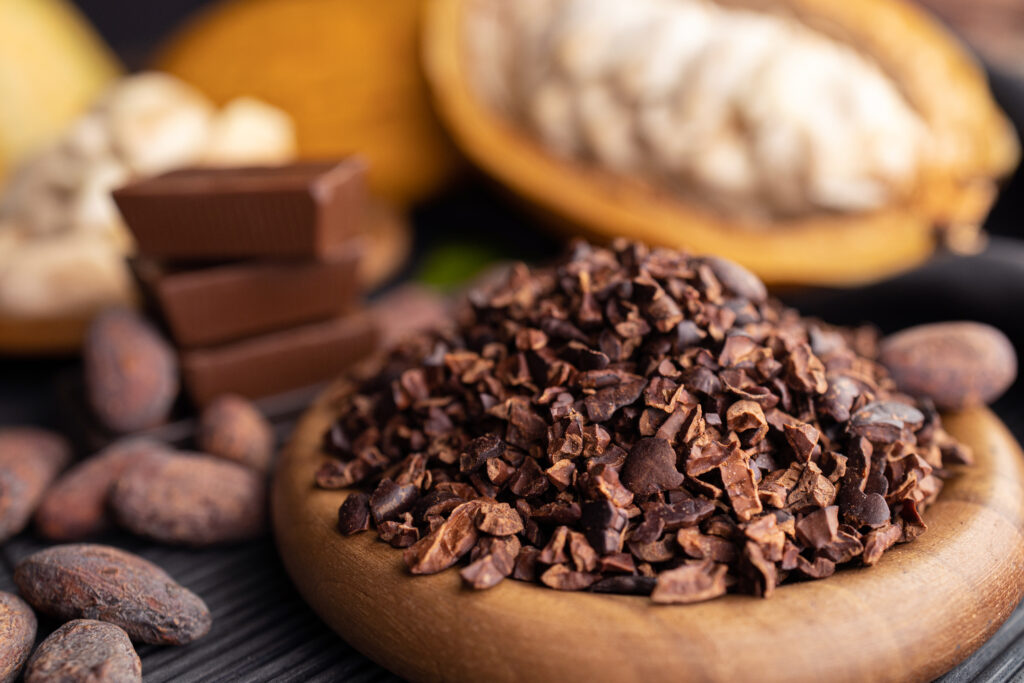
Nutritional Content of Cocoa Nibs
Cocoa nibs are not only known for their flavor but also for their impressive nutritional profile. Made from roasted cocoa beans, they are naturally rich in minerals, antioxidants, and plant-based compounds that support overall health. Because they are minimally processed, premium cocoa nibs retain most of the nutrients found in the cocoa bean itself.
Below is an approximate nutritional composition for 100 grams of roasted cocoa nibs:
| Nutrient | Amount per 100g | Health Benefit |
| Calories | 600 kcal | Provides natural energy |
| Protein | 13 g | Supports muscle and tissue repair |
| Total Fat | 54 g | Source of healthy fats; includes oleic acid |
| Saturated Fat | 33 g | Natural plant-based saturated fats |
| Carbohydrates | 14 g | Provides slow-release energy |
| Dietary Fiber | 9 g | Aids digestion and promotes fullness |
| Sugar | 0.9 g | Naturally low in sugar |
| Magnesium | 272 mg | Supports heart and muscle function |
| Iron | 13.9 mg | Helps with oxygen transport in blood |
| Potassium | 715 mg | Balances electrolytes and supports nerves |
| Calcium | 120 mg | Strengthens bones and teeth |
| Zinc | 6.8 mg | Supports immunity and metabolism |
| Antioxidants (Flavonoids) | High | Protects cells from oxidative stress |
| Caffeine and Theobromine | Trace amounts | Provides mild natural stimulation |
The nutritional richness of African cocoa nibs is one of the reasons they are in high demand globally. They contain antioxidants that help combat free radicals in the body, magnesium that supports energy production, and iron that promotes better blood health.
Because cocoa nibs from Africa are minimally processed, they preserve their natural compounds, making them a preferred ingredient in both health-focused foods and chocolate manufacturing.
Health Benefits and Practical Uses of Cocoa Nibs
- Rich in Antioxidants Cocoa nibs are one of the most antioxidant-rich foods available. They contain flavonoids and polyphenols — compounds that help protect the body’s cells from damage and support heart health. Regular intake of antioxidant-rich foods has been linked to improved blood flow, lower inflammation, and better overall wellness.
- Supports Heart Health The magnesium and flavonoids found in African cocoa nibs help regulate blood pressure and improve circulation. These natural compounds encourage relaxation of blood vessels, contributing to a healthier cardiovascular system.
- Improves Mood and Focus Cocoa naturally contains small amounts of theobromine and caffeine, both of which gently stimulate alertness. It also encourages the release of serotonin and dopamine — the body’s “feel-good” chemicals — helping to lift mood and reduce stress.
- Good Source of Minerals Cocoa nibs are an excellent natural source of iron, magnesium, and potassium, all of which are essential for energy production, nerve function, and muscle health. This makes them a great addition to daily diets for those looking to support balanced nutrition.
- Supports Digestive Health Thanks to their high fiber content, crushed cocoa beans help with digestion and maintaining a healthy gut. Fiber promotes better metabolism and helps regulate blood sugar levels.
Practical Uses of Cocoa Nibs
Cocoa nibs are incredibly versatile and used in a wide range of food and beverage applications.
- Chocolate and Confectionery: Cocoa nibs are ground to produce cocoa liquor, which forms the base of chocolate. They are also used as a crunchy inclusion in chocolate bars or truffles.
- Baking and Desserts: Many chefs and bakers use roasted cocoa nibs in cookies, brownies, and cakes for added flavor and texture.
- Beverages: Cocoa nibs can be brewed like coffee or steeped in milk to create rich, aromatic cocoa drinks. They are also used in craft beers and specialty teas.
- Health and Snack Foods: Increasingly, bulk cocoa nibs are being added to granola, trail mixes, and protein snacks for a natural energy boost.
- Beauty and Wellness: The high antioxidant content makes them a valued ingredient in some skincare and wellness formulations
Because cocoa nibs in Dubai and other regions of the UAE are now in greater demand, suppliers such as Radad International ensure consistent quality and reliable delivery. The company processes and supplies African cocoa nibs from Ghana, known for their strong flavor and high cocoa content, suitable for both small-scale and industrial use.
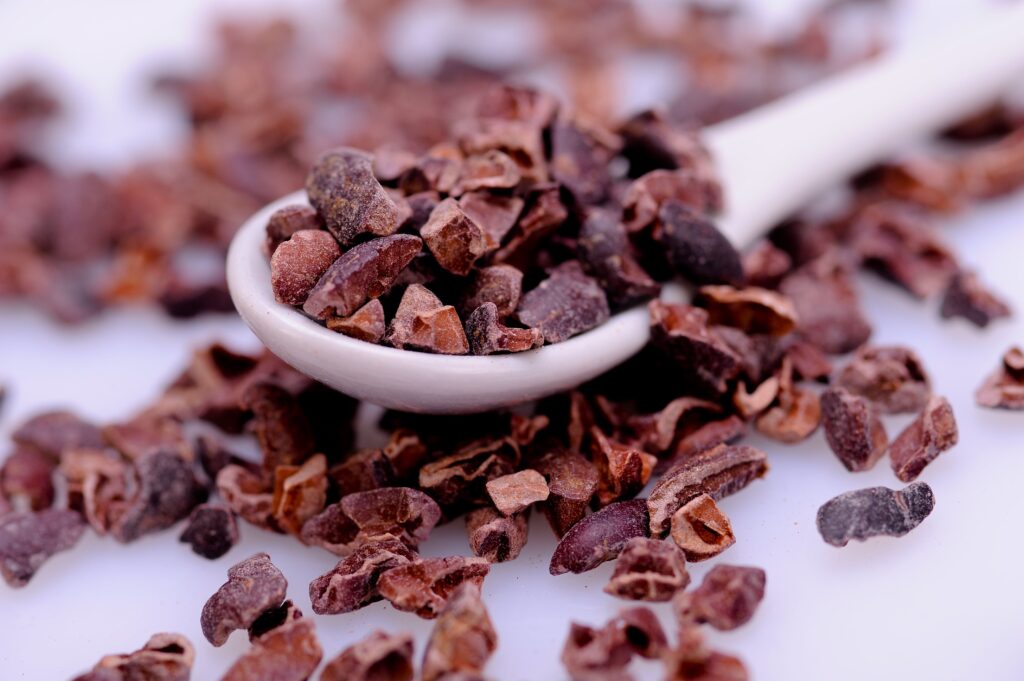
Cocoa Nibs Suppliers and How to Buy Quality Products
Finding the right organic certified cocoa nibs supplier is one of the most important steps in ensuring product quality and consistency, whether for small-scale chocolate production, bakeries, or large food manufacturing. The market for cocoa nibs in Dubai and across the UAE has grown rapidly, creating a demand for reliable suppliers who can guarantee both authenticity and steady supply.
What to Look for in a Cocoa Nibs Supplier
When sourcing premium cocoa nibs, there are a few key factors to consider:
- Origin and Traceability – Always look for single-origin cocoa nibs, as they offer consistent flavor and quality. Ghana, for example, is known worldwide for producing some of the finest African cocoa nibs thanks to its ideal growing conditions and traditional post-harvest methods.
- Processing Standards – The quality of roasted cocoa beans depends heavily on how they’re fermented, dried, and roasted. Reputable suppliers ensure careful handling and hygienic production environments.
- Purity and Freshness – Genuine roasted cocoa nibs should be free from additives, preservatives, and excess moisture.
- Supply Capacity – For manufacturers, consistent supply is critical. A good supplier should be able to handle bulk cocoa nibs orders as well as smaller batches without compromising quality.
- Certification and Quality Control – Look for suppliers who comply with international food safety and quality standards to ensure that every shipment meets export requirements.
Radad International – Trusted Supplier of African Cocoa Nibs
Radad International is one of the reputable names in cocoa sourcing and distribution. Based in Ghana, the company handles the processing, production, and export of cocoa nibs and other cocoa products directly from origin. This ensures complete control over quality, from bean selection to final packaging.
We supply a full range of cocoa products, including:
- Cocoa nibs (roasted and crushed)
- Cocoa powder
- Cocoa mass
- Cocoa butter
- Cocoa beans (unprocessed)
- Cocoa shells
- Cocoa pods
Radad International’s cocoa nibs are recognized for their strong chocolate aroma, clean finish, and high purity. They are produced under strict quality supervision and meet export standards for both food and confectionery applications.
For customers in the UAE, Radad International provides cocoa nibs in Dubai and across the region, with reliable export logistics and the ability to meet custom quantity requirements, from small orders for artisanal chocolatiers to bulk cocoa nibs for large manufacturers.
How to Buy Cocoa Nibs
Businesses or individuals can order cocoa nibs directly through established EU Organic cocoa nibs sellers or importers in Dubai. However, sourcing directly from a producer like Radad International offers advantages such as:
- Competitive pricing through direct factory supply
- Guaranteed freshness due to shorter supply chains
- Customization (e.g., roasted or unroasted nibs, specific packaging sizes)
- Verified origin from certified cocoa farms
Whether you’re sourcing for food production, export, or retail distribution, working directly with a trusted USDA Organic, EU and Halal certified cocoa nibs supplier ensures long-term consistency and confidence in the product you deliver to customers.
Frequently Asked Questions (FAQs) About Cocoa Nibs and Suppliers
What exactly are cocoa nibs?
Cocoa nibs are small pieces of crushed and roasted cocoa beans. They are the purest form of chocolate before sugar or milk is added. Nibs have a rich, slightly bitter chocolate flavor and are used in chocolate production, baking, and health foods.
Are cocoa nibs and cocoa beans the same?
Not exactly. Cocoa beans are the whole seeds taken from the cocoa pod. After the beans are roasted and the shells removed, the inner part is broken into smaller pieces — these are cocoa nibs.
Where do the best cocoa nibs come from?
Some of the finest cocoa nibs in the world come from West Africa, particularly Ghana and Ivory Coast. Ghanaian cocoa is highly valued for its rich flavor, high butter content, and consistent quality. Radad International, based in Ghana, processes and exports African cocoa nibs known for their premium quality and strong chocolate aroma.
Are cocoa nibs healthy?
Yes. Cocoa nibs are naturally rich in antioxidants, magnesium, iron, and fiber. They help improve circulation, support heart health, and provide natural energy. Because they are minimally processed and contain no added sugar, they are also a popular ingredient in health foods.
What are the common uses of cocoa nibs?
Cocoa nibs are used in:
- Chocolate manufacturing (to make cocoa mass, butter, and powder)
- Baking and desserts (as toppings or inclusions)
- Snacks and cereals (for texture and flavor)
- Beverages (in coffee blends or cocoa-based drinks)
- Beauty and wellness products (for their antioxidant content)
What’s the difference between roasted and unroasted cocoa nibs?
Roasted cocoa nibs have a deeper flavor and aroma, commonly used in chocolate making. Unroasted nibs retain more of the bean’s natural acidity and raw flavor, preferred in certain health foods or specialty recipes. Radad International supplies both options depending on customer requirements.
How can I buy cocoa nibs in Dubai or the UAE?
You can purchase cocoa nibs in Dubai from importers, specialty ingredient distributors, or directly from producers like Radad International. The company supplies both bulk cocoa nibs for manufacturers and smaller quantities for local businesses and chocolatiers.
Can I order cocoa nibs in bulk quantities?
Yes. Many suppliers, including Radad International, offer bulk USDA, EU and Halal Certified cocoa nibs for export and industrial use. Bulk orders are ideal for chocolate manufacturers, bakeries, or distributors who require large, consistent volumes.
What packaging options are available for cocoa nibs?
Cocoa nibs are usually packaged in food-grade bags or bulk sacks (commonly 25kg or 50kg). For export, packaging is designed to maintain freshness and prevent moisture absorption during shipping. Custom packaging can also be arranged for branded distribution.
How should cocoa nibs be stored?
Cocoa nibs should be stored in a cool, dry place, away from sunlight and strong odors. Ideal storage temperature is between 18°C and 24°C. Proper storage preserves aroma and prevents the cocoa butter in the nibs from melting or blooming.
What makes Radad International different from other cocoa nibs suppliers?
Radad International handles the entire process, from sourcing cocoa beans in Ghana to roasting, processing, and packaging cocoa nibs for export. This direct control ensures traceability, consistent quality, and competitive pricing. The company also supplies other cocoa products like cocoa powder, cocoa butter, and cocoa mass, making it a reliable one-stop partner for cocoa sourcing.
Are Radad International’s cocoa nibs single-origin?
Yes. All cocoa products from Radad International are single-origin, produced and processed in Ghana. This gives the nibs a distinct flavor profile and quality that remain consistent across every batch.
Do cocoa nibs contain caffeine?
Cocoa nibs contain small amounts of caffeine and theobromine, both natural stimulants. The levels are mild and provide gentle energy without the crash associated with coffee.
What is the minimum order quantity (MOQ) for cocoa nibs from Radad International?
Radad International is flexible with order quantities. The company accommodates both small and bulk orders, depending on the buyer’s needs. This makes it suitable for small chocolatiers as well as large-scale manufacturers.
How long do cocoa nibs last?
When stored properly, roasted cocoa nibs can last up to 18–24 months. Their natural oils keep them stable, but freshness is best maintained in airtight packaging under cool conditions.
Are there quality certifications available for Radad International’s cocoa nibs?
Yes. Radad International’s products meet international food safety and quality standards, and all exports are accompanied by relevant certifications confirming quality, purity, and origin.
Conclusion
Cocoa nibs have become one of the most in-demand ingredients in the chocolate, beverage, and health food industries. From craft chocolatiers to large food producers, more companies are recognizing the value of high-quality nibs, not only for their flavor but also for their nutritional benefits and clean-label appeal.
Sourcing these nibs from the right supplier makes all the difference. Radad International is a trusted name in the cocoa industry. Every product, from African cocoa nibs to cocoa powder, butter, and mass, is produced and processed using carefully selected cocoa beans. The company’s vertical integration allows full control over quality, ensuring that every batch of cocoa nibs meets international standards.
For buyers in the UAE, especially those in Dubai, Radad International provides direct access to authentic African cocoa nibs. Whether you’re sourcing for industrial chocolate manufacturing, artisanal confectionery, or retail packaging, the company can meet your requirements, from small quantities to bulk cocoa nibs.
Every shipment reflects the essence of African cocoa: a strong chocolate aroma, deep flavor, and the consistency that food producers rely on. By combining modern processing with traditional expertise, Radad International connects Africa’s finest cocoa with global demand, supplying cocoa nibs in Dubai, the wider UAE, and beyond.
If you’re looking for dependable USDA, EU and Halal certified cocoa nibs suppliers who understand both quality and logistics, Radad International remains a partner you can trust, supplying excellence, one nib at a time.

